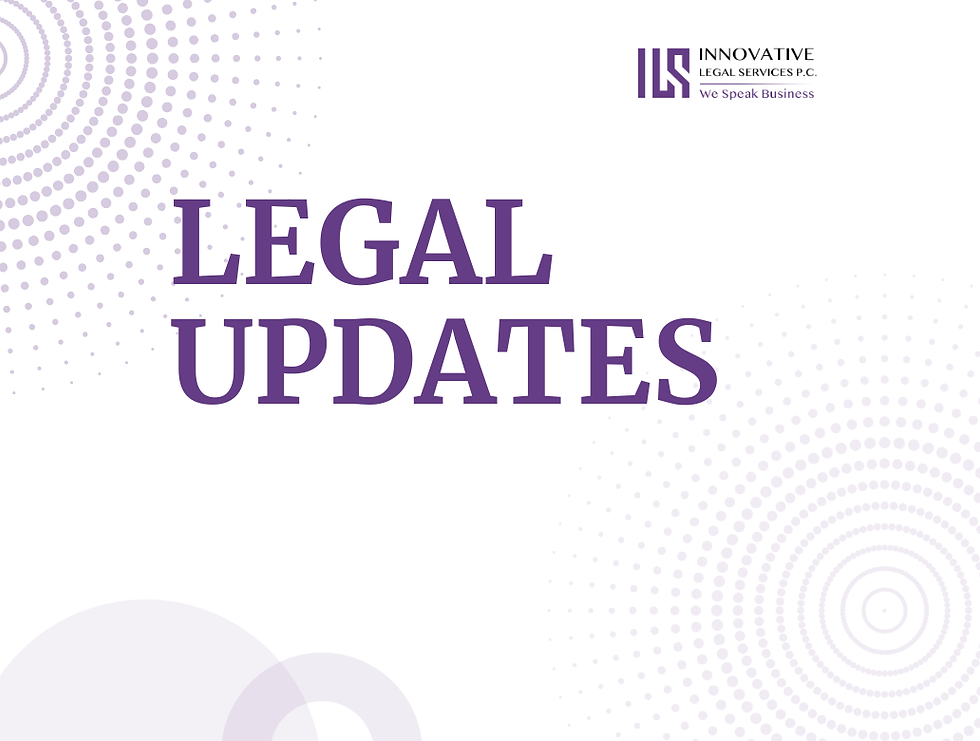California Strengthens Workplace Transparency and Employee Rights
- Susan Shu

- Oct 3, 2025
- 4 min read
Updated: Oct 31, 2025
The California State Senate has approved Senate Bill 294 (SB 294) on September 23, 2025, a landmark piece of legislation designed to enhance workers’ awareness of their constitutional and employment rights. The bill, now awaiting the Governor’s signature, introduces new employer obligations effective February 1, 2026, including mandatory employee notifications and emergency contact protocols, while strengthening protections during immigration enforcement and other law enforcement actions.
For tailored advice on California labor compliance and union-related risk management, please contact ILS Partner, Fiona Xu, at contact@consultils.com. Our attorneys provide strategic, efficient solutions to help employers navigate AB 288 and safeguard their business interests.
Key Provision
Under SB 294, employers must provide all existing employees with a standalone written “Right-to-Know” notice by February 1, 2026, and reissue it annually thereafter. New hires and any employee bargaining representatives must also receive this notice upon onboarding.
The required notice must clearly outline:
Workers’ compensation rights
Notification rights during immigration agency inspections
Anti-discrimination protections against immigration-related retaliation
Rights to organize, join unions, and participate in collective action
Constitutional safeguards when interacting with law enforcement — including protection against unreasonable searches, the right to due process, and the privilege against self-incrimination
Employers are required to deliver this information in a language employees can understand and maintain compliance records — such as issuance dates — for at least three years. The California Labor Commissioner will publish and update a model notice template annually before the law takes effect.
In addition, SB 294 creates a new emergency contact system. Employers must give current employees the opportunity to designate an emergency contact by March 30, 2026, while new hires must complete this process at onboarding. If an employee is arrested or detained at the workplace, the employer must immediately notify the designated emergency contact. Employers are also obligated to notify contacts if such an incident occurs outside the workplace during work hours and the employer becomes aware of it.
Violations may result in civil penalties of up to $500 per employee per instance for general non-compliance and up to $500 per employee per day (capped at $10,000 per employee) for failing to fulfill emergency contact notification duties. SB 294 also prohibits employers from retaliating — including termination or demotion — against workers who exercise their rights or file complaints.
Implications for Employers
Once signed into law, SB 294 will significantly increase compliance obligations for California employers. Companies will need to:
Establish an annual notification process, including multi-language translations and compliance recordkeeping.
Build and maintain an emergency contact system capable of immediate response to workplace detentions or arrests.
Train HR and management teams on constitutional employee rights, anti-retaliation policies, and emergency protocols.
Prepare for a potential rise in employee-initiated claims or litigation, as increased awareness of workplace rights may encourage more workers to seek legal counsel.
Recommended Next Steps
To reduce legal and financial risk ahead of the 2026 effective date, employers are advised to:
Review and update employee work authorization records, including I-9 compliance.
Plan early for annual notifications and monitor forthcoming model templates from the Labor Commissioner.
Create emergency response procedures and assign internal points of contact for employee detentions or arrests.
Conduct specialized training for HR and management teams to ensure accurate communication of rights and proper handling of potential enforcement events.
For tailored advice on California labor compliance and union-related risk management, please contact ILS Partner, Fiona Xu, at contact@consultils.com. Our attorneys provide strategic, efficient solutions to help employers navigate AB 288 and safeguard their business interests.
Disclaimer: The materials provided on this website are for general informational purposes only and do not, and are not intended to, constitute legal advice. You should not act or refrain from acting based on any information provided here. Please consult with your own legal counsel regarding your specific situation and legal questions.

As Partner and Head of Transactions at ILS, Fiona delivers professional legal and strategic support to tech companies—with a focus on AI, medical devices, and fintech. Beyond full-spectrum technology law, she specializes in export control and compliance: supporting tech firms at all growth stages, aiding startups in scaling operations, and helping mature enterprises address regulatory challenges.
Previously, Fiona gained hands-on experience building legal frameworks from scratch. She advised unicorn companies on global expansion and regulatory hurdles, developing deep insight into clients’ growth challenges. Combining legal expertise with commercial judgment, she helps clients establish sustainable legal processes and provides clear guidance to advance their business.
Email: contact@consultils.com | Phone: 626-344-8949

Susan is specialized in employment law and compliance, with additional experience in cross-border investments. With years of experience advising multinational clients, Susan focuses on employment-related matters, including workforce structuring, employee transfers, terminations, compensation and benefits, and workplace policies. She has extensive experience assisting companies in navigating complex labor regulations, managing cross-border employment issues, and resolving workplace disputes.
In addition to her employment law practice, Susan advises on M&A, private equity, venture capital, and cross-border investments. She has assisted international investors with complex deal structures, including VIE frameworks, and prepared due diligence reports and transaction documents.
Email: contact@consultils.com | Phone: 626-344-8949


Comments